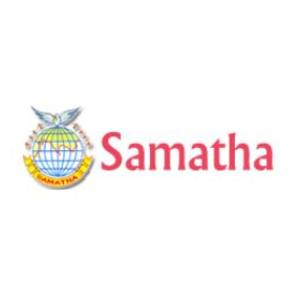About
-
Headquarters
Payakaraopeta, Andhra Pradesh
-
Since
1990
Samatha Community Development and Welfare Society, a charitable grassroots organisation, is devoted to serving impoverished communities through a comp Read morerehensive approach. It cultivates a transformed society where every individual experiences safety, security, and serenity. Samatha, a collaboration of change agents, endeavours to enhance the well-being and enduring transformation of vulnerable segments of society, particularly women and children. This mission is pursued through a holistic commitment encompassing empowered participatory communities with comprehensive development and economic sustainability, prioritized emergency relief focusing on disaster risk mitigation and timely calamity aid, and the promotion of justice through community-based efforts to rectify unjust structures affecting the underprivileged. Its origin traces back to the devastating 1990 floods that swept the low-lying areas on both sides of the Thandava River, subsequently leading to the establishment of the Samatha Community Development Project, driven by generous support with a primary focus on education, health, leadership, and livelihood improvements, particularly for women and children, aiming to bring about enduring positive change in their lives.
Programs
-
Disaster Relief Programme
The devastating Nilam Cyclone in October 2012 severely impacted impoverished communities in Payakaraopeta, causing widespread destruction. Many homes were inundated, and belongings and food were swept away, leaving children and the elderly in distress. Samatha acted swiftly, urging victims to seek refuge in shelters and providing immediate sustenance. Subsequently, 1600 individuals received essential aid packages, including 25 kg of rice, 02 kg of lentils, 02 litres of cooking oil, 01 kg of salt, blankets, towels, saris, aluminium cooking pots, and stainless steel spoons, aiding them during this critical period of need.
-
Child Labour Eradication Programme
Dedicated to eradicating child labour in the Payakaraopeta region, Samatha's objectives include raising community awareness about the issue, offering education and training to former child labourers, and providing counselling for their parents. It established a centre where child labourers were introduced to a nurturing environment, emphasizing the significance of childhood and education. Stipends were provided and 363 children were successfully integrated into Government educational institutions. Awareness programmes led to 19 dropout students and 367 child labour parents enrolling in regular schools, while 5250 individuals (80%) grasped the child labour problem's severity. Skill training in various trades, such as sewing, handicrafts, and electrical wiring, enabled children to pursue their interests, and some embarked on income-generating endeavours or secured jobs.
-
Community Development Programme
StateThe primary aim is to foster self-reliance among individuals across various life domains. In the realm of agriculture and the environment, 37 workshops were conducted, enlightening 1300 people on pollution prevention and the distribution of seedlings and fruit-bearing plants to 74 villagers. Grants were provided for soak pits. Over a decade, 74 adult literacy centres were established in as many villages, benefiting 2345 individuals, with 1138 successfully passing exams. Samatha also established 74 women's Sanghams (1600 members), 37 men's Sanghams (550 members), and 35 youth Sanghams (500 members) across 74 villages. Additionally, 99 health awareness programmes addressed various health topics, reaching 4865 participants.
-
Girl Child Project
StateThe Girl Child Project aims to empower girls aged 11-18 through education, life skills, vocational training, and healthcare. Training encompassed sewing, beautician courses, computer basics, and creating contemporary clothing designs. Lessons emphasized self-esteem, supporting spouses, and financial independence. Premarital counselling, family-building, child-rearing, and life purpose were also taught. Nutritional diets, medical camps, and medical support were provided. Girls learned about menstrual health, nutrition, and early marriage risks. Girls grew both personally and in appearance. Many opted for marriage after 18, fostering harmonious family relationships and educating their children effectively.
-
HIV/AIDS Rehabilitation Programme
StateThe HIV & AIDS Rehabilitation initiative seeks to lower HIV incidence by boosting awareness and improving the economic status of PLHA. It organised 180 awareness programmes in 80 villages, reaching various community levels and reducing HIV/AIDS contraction rates. Counselling benefited 400 individuals by emphasizing the importance of life, regular medication, and family relationships. Fifty-four medical camps enhanced health, and 16 skill training programmes engaged 340 participants to improve economic prospects.
-
Child Development Centres Programme
Child Development Centres strive to lift children out of poverty by nurturing their physical, cognitive, and social growth, fostering self-reliance. These centres provide children with daily nutritious meals, regular medical checkups, and financial support for medical needs. It also promotes health awareness, and hygiene practices, and engages children in sports and indoor games. Operating across five locations in Andhra Pradesh, the centres offer educational support, tutoring, exam preparation, and supply uniforms, school fees, and transportation assistance, resulting in a 98% school attendance rate and reduced dropout rates, ensuring children's continued education and overall well-being.
Leadership Team
Demographics & Structure
-
No. of Employees
6-20
M&E
-
Internal, External Assessors
No
Policies
-
Ethics and Transparency Policies
No
-
Formal CEO Oversight & Compensation Policy
No
Political & Religious Declarations
-
On Affiliation if any
No
-
On Deployment Bias if any
No
Registration Details
-
PAN Card
AAGTS0822A
-
Registration ID
1428/2002
-
VO ID / Darpan ID
AP/2017/0164977
-
12A
AAGTS0822AE20083
-
80G
AAGTS0822AF20081
-
FCRA
010350188
-
CSR Registration Number
Not Available
Location
Other Details
-
Type & Sub Type
Non-profit
Society
Website
Financial Details
-
2018-19
IncomeRs.524,811ExpensesRs.420,824Admin ExpensesRs.11,384Program ExpensesRs.409,440Tip: Click on any value above to exclude it. -
2019-20
IncomeRs.2,062,258ExpensesRs.1,864,890Admin ExpensesRs.172,547Program ExpensesRs.1,692,343Tip: Click on any value above to exclude it. -
2020-21
IncomeRs.1,032,897ExpensesRs.727,189Admin ExpensesRs.113,954Program ExpensesRs.613,235Tip: Click on any value above to exclude it.



